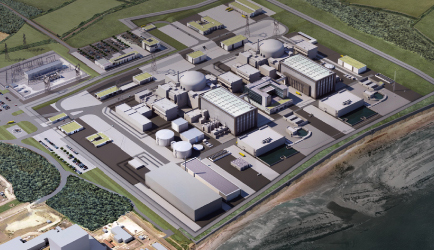For a blogger on nuclear energy, the Hinkley Point C project in Britain is a gift that just keeps giving. There are many different groups, issues, nations, etc. that are involved in Hinkley Point C. New things keep coming to light and new things keep happening that need to be updated. Basically, the U.K. has contracted with the French company EDF to build two nuclear power reactors at Hinkley Point. EDF and the U.K. could not finance the whole project so they are cutting a deal with the Chinese for about one third ownership. This has upset some groups in the European Union and in the U.K. The U.K. is going to be shutting down most of their existing nuclear reactors and some of their old coal power plants in the next ten years. These power generation sources will have to be replaced by new power generation and Hinkley Point C is expected to play a major role in that replacement. The lower limit for the estimated cost for the two new reactors is around twenty five billion dollars. This is far beyond the suggested price of six billion dollars for economically competitive nuclear power reactors.
One big concern about the Hinkley Point C project is the fact that the U.K. government is going to guarantee the owners of the two new reactors a price for their electricity that is three times the current price being paid by U.K. ratepayers. This guarantee extends for thirty five years after the new reactors are turned on. The deal provides for subsidies up to sixty billion dollars and includes government guarantees with respect to nuclear waste disposal and accident insurance. The new reactors don't have to start producing electricity before 2033.
Should the new reactors be shut down in the future for any reason other than safety or security, then there is a provision for payments to EDF of up to thirty billion dollars. This has been referred to as a "poison pill" provision in the contract. Supporters of the project say that guaranteed prices for electricity and provisions for waste disposal, insurance, and unexpected shutdowns of new nuclear power reactors are standard in contracts of this type. They point out that there will be twenty five thousand constructions jobs and that the new reactors are critical for replacing retired energy sources. Critics say that the poison pill virtually guarantees that there is zero risk for EDF and backers such as the Chinese. They feel that the high price for construction of the two new reactors, the price guarantee for the electricity and the generous subsidies are already overly generous to the owners of the new reactors without the poison pill.
In 2007, EDF said that the new reactors would be generating electricity by 2017. After repeated delays, they now say that the new reactors will start generating electricity in 2025. As mentioned before, the contract allows the start date to be pushed back as far as 2033. Two other reactors based on the EDF design for the Hinkley Point C reactors are way behind schedule and way behind budget. The final commitment of EDF to the project has still not been signed and the Chinese contract has also not been finalized.
Prof Catherine Mitchell, an energy policy expert at the University of Exeter said that,"This is a dreadful agreement for the nation. The government is already paying a high price, index-linked for an incredibly long 35 years. This should be more than sufficient for a professional, business contract. " and she also said, "Energy economics are changing rapidly and so the momentum is towards decentralized, smart and flexible energy systems. It is moving away from large, inflexible power plants like Hinkley. If it ever gets funded, it will be a white elephant before it is even finished and this government, with this £22bn 'poison pill', will have tied the next generation into paying for it, for no reason that I can understand. If it is simply political saving face, it really is pitiful."
Artist's concept of Hinkley Point C reactors:
